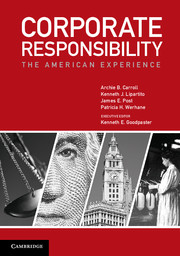Book contents
- Frontmatter
- Contents
- About the Authors
- Foreword
- Preface
- Introduction The Corporation in the Public Square
- Part I The Seeds of Corporate Responsibility
- Chapter 1 Foundations of Capitalism and the Birth of the Corporation (1776–1880)
- Chapter 2 The Turbulent Rise of the Corporation (1880–1900)
- Chapter 3 The Progressive Era and a New Business–Government Relationship (1900–1918)
- Chapter 4 The Corporation's Case for Social Responsibility (1918–1929)
- Chapter 5 The Corporation and National Crisis (1929–1945)
- Part II Corporate Responsibility Comes of Age
- Part III Taking Account of Corporate Responsibility
- Endnotes
- References
- List of Plates
- Index
- Plate section
Chapter 1 - Foundations of Capitalism and the Birth of the Corporation (1776–1880)
Published online by Cambridge University Press: 05 November 2012
- Frontmatter
- Contents
- About the Authors
- Foreword
- Preface
- Introduction The Corporation in the Public Square
- Part I The Seeds of Corporate Responsibility
- Chapter 1 Foundations of Capitalism and the Birth of the Corporation (1776–1880)
- Chapter 2 The Turbulent Rise of the Corporation (1880–1900)
- Chapter 3 The Progressive Era and a New Business–Government Relationship (1900–1918)
- Chapter 4 The Corporation's Case for Social Responsibility (1918–1929)
- Chapter 5 The Corporation and National Crisis (1929–1945)
- Part II Corporate Responsibility Comes of Age
- Part III Taking Account of Corporate Responsibility
- Endnotes
- References
- List of Plates
- Index
- Plate section
Summary
This chapter sets the stage for the story of corporate responsibility by tracing some of the seminal ideas underpinning its development. At base are the recognition of the importance of human rights, the Industrial Revolution (the main engine for economic growth), the expansion of free enterprise, and the development and legitimacy of the modern corporation. These key ideas led to events that moved the nation from an agricultural and trade economy to a mature capitalistic enterprise in which corporate responsibility is an important element.
From the beginning of recorded history, human beings have been engaged in what the eighteenth-century political economist Adam Smith called the urge to “truck, barter and exchange.” Early on in various civilizations human beings owned, developed, and traded private property. But what distinguishes modern capitalism is not merely private ownership and trade. It is also the development of free markets for exchange, the capacity to organize labor efficiently for the production of goods and services, the ability to accumulate private capital, and the formation and legitimacy of corporations to do these things. Indeed, as Joyce Appleby writes, “capitalism has been described not merely as an economic system but more broadly as a cultural system rooted in economic practices that rotate around the imperative of private investors to turn a profit. Profit-seeking usually promotes production efficiencies [industrialization], like the division of labor, economies of scale, specialization, the expansion of the market for one's goods, and above all, innovation.”
- Type
- Chapter
- Information
- Corporate ResponsibilityThe American Experience, pp. 31 - 61Publisher: Cambridge University PressPrint publication year: 2012



